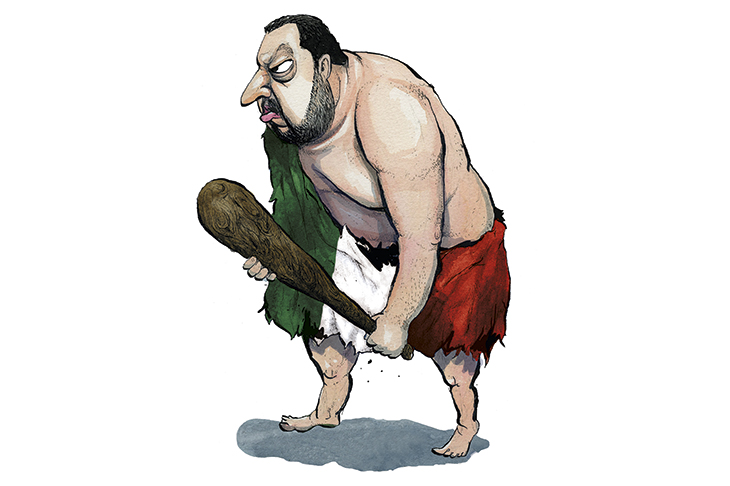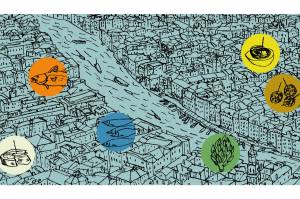Last summer, when Italy became the first major European country to get a populist government, Steve Bannon was cock-a-hoop. The former White House chief strategist had spent much of his time in Europe last year aiding and abetting populists. He called Italy ‘the center of the political universe right now’. He was full of praise for what he described as the altruism of the alt-left Five Star movement led by Luigi Di Maio and the radical right Lega led by Matteo Salvini. The two populist parties had buried their differences for the sake of the nation, Bannon believed, as they formed a coalition government.
But for all his excitement, this anti-establishment honeymoon couldn’t last. Five Star and Lega were soon at each other’s throats, rowing about the limited program they had managed to agree about. Bannon quietly moved on. What is extraordinary is the impact this short-lived government has had on the fortunes of two coalition parties. In the general election of March 2018, Five Star won 32 percent of the vote and Lega 17. In the Euro elections this May, these figures were more or less reversed, with Lega’s share at 34 percent and Five Star’s at 17.
Salvini —known as ‘Il Capitano’ —has proved a man of action, able to stop NGO charity ships ferrying illegal immigrants across the Mediterranean from Libya by banning them from docking in Italian ports. This was his do-or-die electoral pledge, and he delivered. He has also turned out to be surprisingly popular with Italian businesspeople, with his pledges of Trumpian tax cuts and infrastructure spending. He wants Italy to borrow more and doesn’t care much about EU deficit rules that would stop him. ‘The flat tax and big cuts in taxes for companies and families will have to be a fundamental part of the next budget. We hope that Europe will allow Italy to return to growth,’ he said recently. He’s daring Brussels to stand in his way.
Lega is increasingly seen as prudent, too, unlike the Italian left. The party’s efficient record in Lombardy is regarded as a model for future success. Five Star, by contrast, have looked like a protest movement that cannot make the transition to government. Virginia Raggi, Five Star’s mayor of Rome, for instance, has proved notoriously useless.
Emmanuel Macron, the great white hope of the European elite, has frequently expressed outrage at Italy’s populist government for its migrant crackdown. But this seems rich when France has suspended the Schengen Agreement on free movement within the EU at its frontier with Italy on the Riviera. The French police send back dozens of migrants every day. So who’s the fascist?
Salvini has now pulled the plug on the coalition government by tabling a no-confidence motion in prime minister Giuseppe Conte last Friday while the political class was on holiday. His aim is a general election in late October just before the Brexit deadline. If the polls are right he could — amazingly for an Italian politician — win on his own (to do so Lega needs 40 percent of the vote). It’s more likely he’d stand with the small post-fascist party, Brothers of Italy, led by Giorgia Meloni, which is polling at 6 percent; and perhaps too with Silvio Berlusconi’s Forza Italia which is at 8 percent. Lega stood with both at the last general election.
In an interview in Monday’s Il Giornale, the daily owned by the Berlusconi family, Salvini announced: ‘I shall ask Berlusconi and Meloni to run together with me… I shall lead an Italy that says “yes” against an Italy that says “no”.’ But a new general election is by no means a foregone conclusion. Salvini’s opponents, who now include Five Star, will do everything they can to avoid one. To stop Salvini there is even talk of a coalition between Five Star and its other sworn enemy — the post-communist Democratic party — which got 18 percent of the vote in the 2018 election.
But if Il Capitano does become prime minister, Brussels will have another major October crisis apart from Brexit. Salvini is a patriot and hostile to Euro imperialism. A government led only by him would break the EU’s fiscal pact on deficit limits and create a major problem in the heart of Euroland. That in turn would revive Lega’s flirtation with taking Italy out of the Euro — a policy it reluctantly put on ice only after Marine Le Pen, who also advocated France leaving the Euro, lost the 2017 French presidential election.
Down the centuries, Italy has so often been the crucible from which revolutionary ideas have emerged. But it is ludicrous to place Salvini on the far right. To his fast-growing army of admirers, he is a democrat and a patriot — or nationalist if you insist. But what is certain is that he absolutely detests socialists.
Salvini and Lega do not go around beating opponents up or smashing up their shop windows. It is his opponents who tend to use violence. What Italy suggests is that right-wing populism is proving more effective, in government, than the left-wing populism tried by Greece.
Matteo Salvini does have something in common with Benito Mussolini: a gift for connecting with the crowd. He spends much of his time on Twitter and Facebook where he has 3.5 million followers. When he tours Italy, he always leaves the stage to mingle with the crowd. This summer he has been visiting the country’s beaches, often bare-chested, which is just what Mussolini did. The crowd loved Il Duce. The crowd loves Il Capitano.
This article was originally published in The Spectator‘s UK magazine.


















